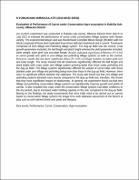| dc.description.abstract | KYOMUKAMA IMMACULATE (2010-M152-20030)
Evaluation of Performance of Carrot under Conservation Agro-ecosystems in Kakiika Sub-county, Mbarara District
An on-farm experiment was conducted in Kakiika sub-county, Mbarara District from March to July 2012 to evaluate the performance of carrot under conservation tillage systems with Nantes variety. The experimental design used was Randomised Complete Block Design (RCBD) with one block composed of three plots replicated three times with two treatments and a control. Treatments comprised of Zero tillage and Potholing tillage system. The dug-up field was the control. Crop growth parameters included; the leaf length and plant height whereas the yield parameter included; tuber weight, tuber girth size and tuber length. Results indicated significant difference (P≤ 0.05) in carrot growth and yield in zero tillage and potholing tillage systems as well as the control. However, results did not show significant effect (P≥ 0.05) of tillage systems on tuber girth size and tuber length. The study showed that all treatments significantly affected the leaf length and plant height with crops under zero tillage system growing faster than those under potholing and the dug-up field. The tillage systems significantly affected the weight of carrot tuber with those planted under zero tillage and potholing being more than those in the dug-up field. However, there were no significant effects between the replicates. The study also found out that zero tillage and potholing systems attracted more insects compared to the dug-up field and, therefore, this shows that they have significant impact on biodiversity. In general, the experiment found out that zero tillage and potholing conservation tillage systems can significantly improve growth and yields of carrots. It also revealed that crops under the conservation tillage systems had better resilience in the dry period, due to increased water holding capacity in the soil, compared to the dug-up field. Basing on the findings, the study recommends that more trials need to be carried out on carrots based on conservation tillage systems for longer time with elaborate assessment of the factors at play such as soil nutrient levels and, pests and diseases.
Key words: Performance, Carrot, Conservation, Agro-ecosystem | en_US |


